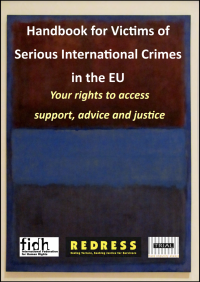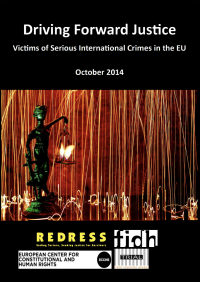Publications
REDRESS’ publications are also available in hard copy format. Please contact us for further information on [email protected].
In this letter, REDRESS and other NGOs urge the UK Prime Minister to establish an inquiry into UK involvement in rendition and torture, with the powers and independence it needs to get to the truth, and a mechanism to allow the meaningful participation of victims. The other NGOs are the AIRE Centre, Amnesty International UK, Cage, Freedom from Torture, JUSTICE, Liberty, Reprieve and Rights Watch UK.
REDRESS has published a new handbook to help victims of serious international crimes and their families access support and justice in the European Union with partners FIDH and TRIAL. It aims to serve as a guide for victims of serious international crimes (genocide, crimes against humanity, war crimes, torture and enforced disappearance) who are interested in filing a formal complaint within the EU as well as victims who are already seeking justice through EU courts. It may also be useful for victims that are seeking asylum as well as individuals living in another country outside the EU, but have information or evidence which suggests that persons or organisations responsible for what happened are inside the EU.
REDRESS submitted a report to the UN Office of the High Commissioner of Human Rights (OHCHR) about the prevalence of torture in Sri Lanka, to aid the Office's Investigation on Sri Lanka (OISL). In particular, the submission addressed developments relating to torture in the period 2002-2011, with a focus on state responsibility. The submission highlighted cases of torture that REDRESS and others brought before the UN Human Rights Committee, including Sri Lanka’s failure to engage with the Committee in response to individual complaints, and to implement the Committee’s views. It argues that the lack of response to complaints at the international level forms part of the broader problem of the systemic nature of torture and impunity in Sri Lanka. This includes the failure of Sri Lanka to undertake the legislative and institutional reforms needed to bring relevant law and practice in line with its international obligations.
In this letter addressed to the Intelligence and Security Committee of Parliament, REDRESS and other NGOs question whether the decision of the UK government to ask this Committee to investigate the treatment of detainees and the UK involvement in rendition was lawful or appropriate.The organisations also reiterate the need to establish an independent judicial inquiry into these matters. The other NGOs are the AIRE Centre, Amnesty International UK, Cage, Freedom from Torture, JUSTICE, Liberty, Reprieve and Rights Watch UK.
In these comments, Amnesty International, the Community Empowerment for Progress Organization (CEPO), the Enough Project, Human Rights Watch, South Sudan Action Network on Small Arms (SSANSA) and REDRESS highlight several key concerns regarding the draft National Security Service Bill of 8 October 2014 of South Sudan. The Bill was originally tabled before the National Legislative Assembly (NLA) in May 2014. The third reading took place on 8 October 2014. While some positive changes were incorporated into the Bill, the organisations remain concerned that it would give the NSS broad powers, without sufficient oversight and safeguards against abuse. Therefore, they call on members of parliament to vote against the Bill during the final reading and to make further amendments to bring it in line with South Sudan’s Constitution and with regional and international human rights obligations.
This report summarises the key findings of a day-long workshop at the Esmée Fairbairn Foundation to discuss upcoming changes to legal service provision, the impact of the changes to welfare and support services already in place, the current state of the law on issues that vulnerable individuals often face, and the ways that relevant groups can work better together. Experts from various different law firms and NGOs gave insights into the different challenges facing vulnerable people and those legal professionals working with them and discussed the increased funding that would be required to meet increasing demands on the third sector as a result of cuts to public services.
This brief, prepared by REDRESS and the African Centre for Justice and Peace Studies (ACJPS), outlines the main concerns of the organisations in relation to Sudan's implementation of the International Covenant on Economic, Social and Cultural Rights (ICESCR).
The report examines the hurdles faced by victims of serious international crimes in the EU that prevent them from exercising their rights in proceedings, including the right to be protected from reprisals and the right to receive information about the progress of cases that concern them. The report highlights how the EU Directive on minimum standards on the rights, support and protection of victims of crime (which all EU countries must incorporate into national law) applies to victims of serious international crimes such as genocide, crimes against humanity, war crimes, torture and enforced disappearance. Most EU countries have a long way to go to put in place the necessary safeguards for victims required by the Directive. Encouraging and assisting victims to come forward and participate in criminal proceedings would improve the prospects for successful investigations and prosecutions as well as ultimately enhance victims’ ability to access justice.


